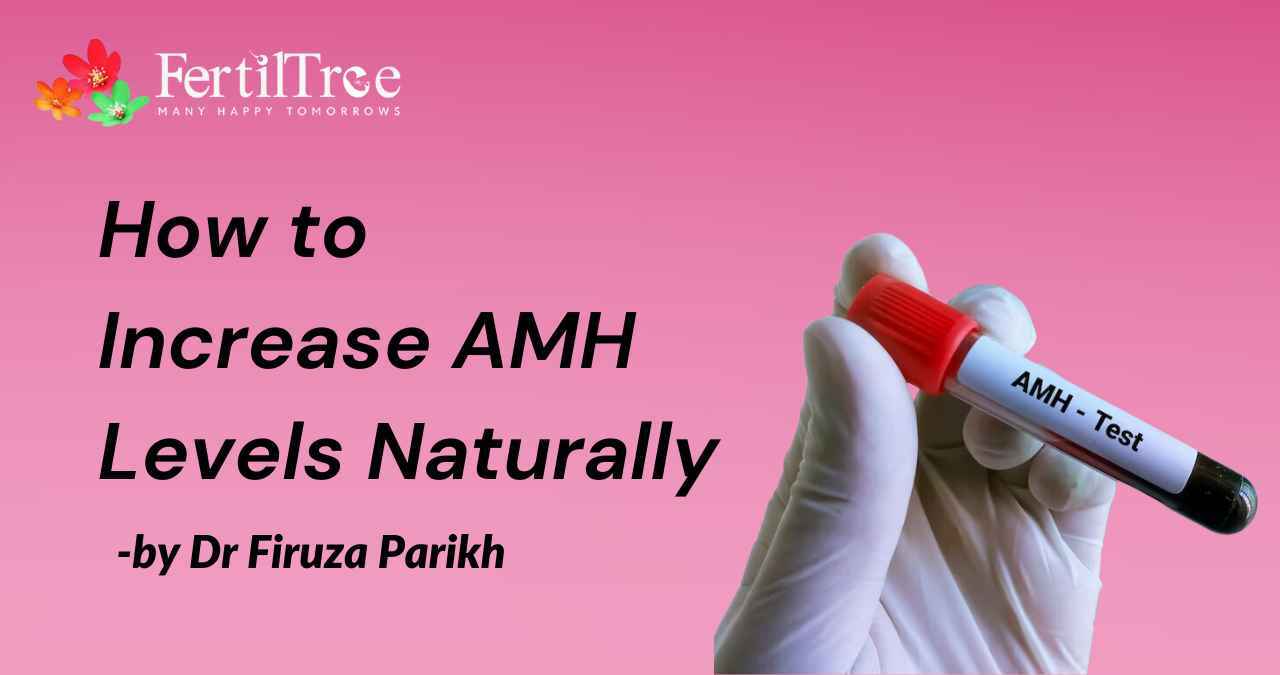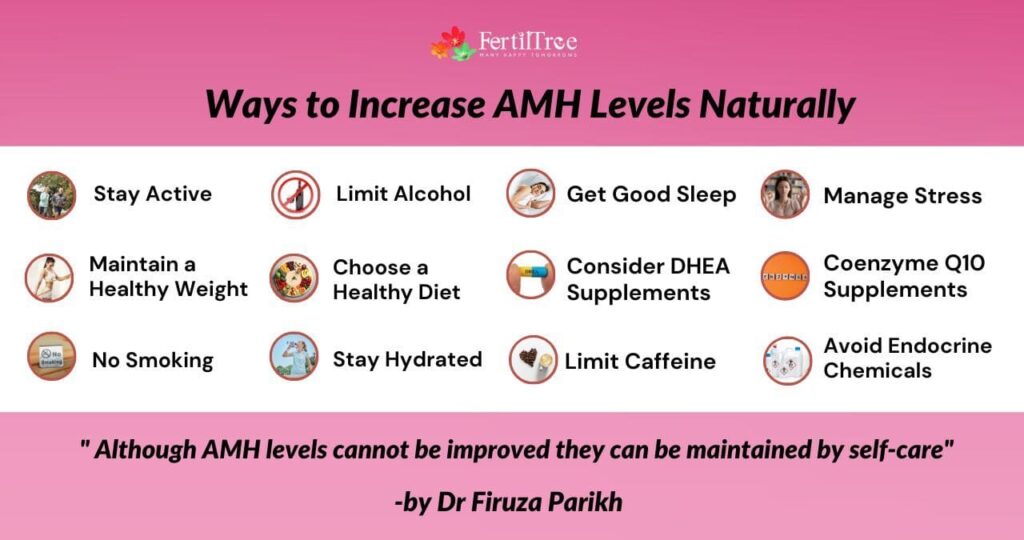
AMH testing is essential to understand the ovarian reserve of a woman. A low AMH means that there are fewer eggs available in the ovaries, which may imply that getting pregnant maybe an issue.
At birth the ovary contains about 1/2 million/oocytes (eggs). And as we age, this number becomes smaller and smaller. And by the time we hit puberty, the egg pool remains around 300,000. Then, the next 30-40 years of our reproductive journey see a much decline in egg supply. And when menopause comes into the picture, virtually no eggs remain, marking the end of the fertile span.
Hence, it becomes important for women to be aware of the AMH levels.
Increasing AMH Levels Naturally: Table Of Content
What Is AMH ?
Anti-Müllerian Hormone (AMH), which is made by granulosa cells in ovarian follicles, is a key sign of a woman’s ability to have children by showing how much ovarian reserve she has.
AMH is secreted by the antral & pre-antral follicles. These are the follicles that harbour the eggs which are ready to ovulate.
In simple terms, when your AMH levels are high, it indicates that you have more eggs, and when they are low, there are fewer eggs.
AMH levels provide an estimate of egg quantity & quality.
What Is A Good AMH For Your Age?
Different levels of the Anti-Müllerian Hormone (AMH) change with your age, and the following numbers show possible problems based on your age:
- At 45 years: 0.5 ng/mL
- At 40 years: 1 ng/mL
- At 35 years: 1.5 ng/mL
- At 30 years: 2.5 ng/mL & above
- At 25 years: 3.0 ng/mL & above
For a fertile woman, an average AMH level falls within the range of 1.0 to 4.0 ng/mL. If your AMH values are between 1.0 to 4.0 ng/mL, they are generally considered average. However, if your AMH falls below 1.0 ng/mL, it is considered low, and values below 0.4 ng/mL are considered significantly low.
Also Read: What is a Good AMH Level for IVF to Get Pregnant?
Potential Causes of Low AMH Levels
Here are the potential reasons why someone might have low levels of Anti-Müllerian Hormone (AMH):
- Age: As women age, especially after 35, their AMH levels naturally decrease because there are fewer eggs left in the ovaries.
- Diminished Ovarian Reserve: Low AMH levels can indicate a reduced number of eggs available for fertilization, known as diminished ovarian reserve.
- Polycystic Ovary Syndrome (PCOS): Women with PCOS may experience lower AMH levels due to the hormonal imbalances associated with the condition.
- Endometriosis: This condition, where tissue similar to the lining of the uterus grows outside the uterus, can lead to lower AMH levels possibly due to damage to ovarian tissue.
- Genetic Factors: Some genetic conditions can affect how much AMH the body produces or how the ovaries function.
- Medical Treatments: Treatments like chemotherapy or radiation therapy for cancer can impact ovarian function and decrease AMH levels.
- Ovarian Surgery: Previous surgeries on the ovaries can reduce ovarian reserve and lower AMH levels.
- Smoking: Smoking has been linked to lower AMH levels in women.
- Environmental Factors: Exposure to certain environmental toxins may affect ovarian function and reduce AMH levels.
- Other Medical Conditions: Conditions such as autoimmune diseases or thyroid disorders can affect ovarian function and AMH levels.
These factors can contribute to lower AMH levels, which are important indicators of ovarian health and fertility potential.

Ways to Increase AMH Levels Naturally
Although AMH levels cannot be improved they can be maintained by self-care. You cannot directly raise your AMH levels with medicine; they are mostly determined by your age and genetics. However, there are some things you can do to keep your reproductive system healthy. You can do the following:
- Stay Active: Engage in regular physical activity to improve your health and fertility.
- Maintain a Healthy Weight: Your weight influences AMH levels, so keep it in a healthy range.
- No Smoking: If you’re a smoker, quitting is a must, as smoking can negatively impact AMH levels.
- Limit Alcohol: Moderating alcohol intake is a good way to go, given its potential detrimental effects on fertility.
- Choose a Healthy Diet: Choose a healthy diet that is well-balanced and full of vitamins and antioxidants.
- Stay Hydrated: Staying hydrated is always good for your health in general, including your reproductive health.
- Get Good Sleep: Getting enough good sleep is important for keeping a balance for the reproductive hormones.
- Manage Stress: Take good care of your stress levels because chronic stress can disrupt hormone balance.
- Limit Caffeine: Keep your coffee consumption in check, as high caffeine intake can affect fertility.
- Consider DHEA Supplements: DHEA, a natural hormone, has shown promise in maintaining AMH levels; discuss it with your fertility specialist.
- Coenzyme Q10 (CoQ10) Supplements: CoQ10 is an antioxidant that may improve the quality of eggs.
- Ensure Adequate Vitamin D: Not getting enough vitamin D can impact your AMH levels. Getting enough of this vital vitamin is crucial.
- Avoid Endocrine Disrupting Chemicals: Limit your exposure to chemicals in certain plastics, cosmetics, paint, varnish and pesticides that can disrupt hormone balance.
Best Food to sustain your AMH
When it comes to boosting AMH levels, there is not a specific diet proven to do so, but maintaining a healthy diet is always the safest way to go. Here is a list of foods you could add to your diet as they may improve ovarian function and egg quality:
- Berries: Packed with antioxidants, berries protect eggs from damage.
- Leafy Greens (Spinach, Kale): This particular nutrient is vital for fertility because it is high in folate.
- Fish (Salmon): Loaded with omega-3 fatty acids, salmon has been known to be important for reproductive health.
- Nuts and Seeds: These contain Vitamin E, an antioxidant that enhances egg health.
To be on the safer side, you might want to consult your doctor for the best outcome.
Read more: How To Improve Egg Quality After 40
Is It Possible To Get Pregnant With Low AMH?
Yes. If you have low levels of AMH, it is important to know that pregnancy can still occur naturally, as AMH levels fluctuate monthly. Whether using your own eggs or donor eggs, you have the possibility of conceiving naturally despite a low AMH level but this is not routine. Your fertility is not solely determined by your AMH level, and there are alternative ways for you to enhance and improve your fertility.
Read more: 18 Best Foods To Increase Sperm Count and Motility
Final Thought
As you can see, some lifestyle and dietary changes can help to improve your AMH levels, ovarian reserve and fertility. Please remember that it is always best to be prepared and take preventative measures so as not to face any complications in the future. To get a consultation, schedule an appointment with Dr.Firuza Parikh at the Best IVF Centre in Mumbai.
Read more:
- Foods To Improve Female Egg Quality
- Foods To Increase Sperm Count and Motility
- hCG Levels After IVF Embryo Transfer
FAQs: How to Increase AMH Levels Naturally?
What is AMH?
Anti-Mullerian Hormone is a protein produced by cells in ovarian follicles. It helps in the development of ovarian follicles and is often used as a marker of ovarian reserve.
What is the significance of AMH levels?
AMH levels are indicative of a woman’s ovarian reserve, which refers to the quantity and quality of her remaining eggs. Higher levels typically suggest a greater number of eggs and potentially better fertility, while lower levels may indicate reduced fertility.
How are AMH levels tested?
AMH levels are typically measured through a blood test. This test can be done at any time during the menstrual cycle since AMH levels do not fluctuate significantly throughout the cycle.
What are normal AMH levels?
Normal AMH levels can vary depending on factors such as age, ethnicity, and the testing laboratory’s reference range. However, in general, higher levels are typically seen in younger women and tend to decrease with age.
Can AMH levels predict fertility?
While AMH levels are correlated with ovarian reserve, they are not a definitive predictor of fertility. Other factors, such as egg quality and reproductive health, also play crucial roles in determining fertility.
Does AMH tell me anything about my chances of getting pregnant right now?
No, the AMH test doesn’t predict pregnancy chances. Fertility depends on other factors like fallopian tube health, sperm quality, ovulation timing, etc.
Does AMH tell me anything about my chances to conceive in the future?
AMH detects ovarian reserve, giving an idea about ovarian health. It can reveal premature menopause, where egg supply runs out early. Testing AMH helps in taking preventive steps.
u003cstrongu003eI have low AMH. Does it mean I am infertile?u003c/strongu003e
No, having low AMH doesn’t mean infertility. If you have regular periods and ovulate monthly, you’re fertile like others. AMH affects ovarian reserve but doesn’t prevent future conception.
u003cstrongu003eI have high AMH levels. Does it mean I am super fertile?u003c/strongu003e
No, high AMH doesn’t mean super fertility. You still produce one egg monthly. High AMH might cause irregular periods or menstrual issues instead.
Book A Consultation

